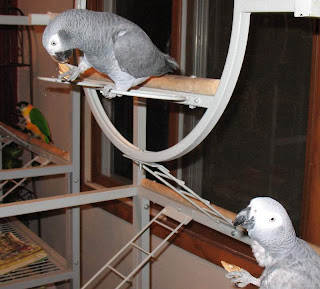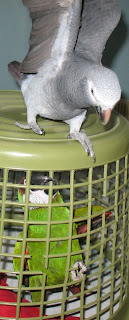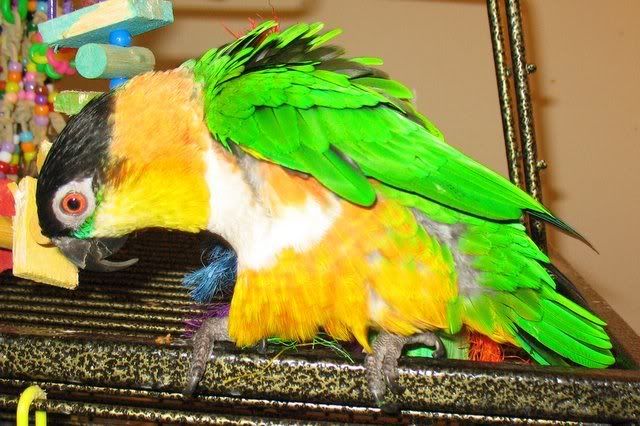It's been a long time since the last time I posted my
thoughts on the species of parrots that share our home. That's because the only remaining bird left from my initial plans is Rocky (we've since added Stella but I'm not ready to write much about her at this point -- we're still watching her come out of her shell!) and I'm not quite sure how to succinctly write this post. I guess we'll see what happens. Also, don't bet on this being succinct!
I know this is ridiculously long, but if anyone is considering adding a severe macaw to their house, please read and think about it. As always, feel free to ask any questions in the comments. I don't have any agenda and will be as honest as possible.
As anyone who has perused my blog knows, Rocky and I have a very unusual relationship. From the outset, let me say that I love this little guy so much and, despite what I may write about him here, he is not leaving our household, so don't worry about that!
Before taking Rocky in, I had done some internet research on mini macaws. Everything I read (mostly on breeder sites, where they want to show their wares in the best possible light in order to stay in business) said (and I'm paraphrasing), "Want the personality of a macaw but with less mess/noise/destruction/etc? Try a mini macaw!" They were described as very intelligent and playful, great talkers, and great family birds. He is very intelligent and playful, he talks some, but is most definitely not a great family bird. If all breeders and pet stores were honest about the realities of living with a severe macaw, none would ever sell.
Needless to say, Thomas and I were not prepared for him and the way our lives would have to change.
We brought him home to foster for the rescue where we volunteer as he needed frequent medication for his enlarged preen gland. We wanted to ensure that he would be properly medicated and monitored, and that would be easier to do in our house than at the shelter, where things are much more chaotic.
Doing additional searching for severe macaw personalities led me to
this article, which was my first inkling that things might not turn out to be as rosy as anticipated. I am quoting from the relevant paragraph on severe macaws:
"In my opinion, I have never, nor will I ever, suggest anyone buy one for a family or pet quality bird. Though they may well be manageable for some people, the majority of pet owners will have problems with severes and will 'dump' them at the first opportunity - because the birds are not what they expected. These guys are hard headed, opinionated, and for the most part a one person only bird. I do not remember ever hearing of one that was a good quality pet for more than ONE person in the household."
And that's coming from a macaw
breeder. Since breeders need to encourage parrot ownership in order to stay in business, when one offers contrary advice, it's generally a good idea to listen, or at least think about what they have said.
To make a long story short, Thomas and I decided to adopt Rocky. Among the reasons? Apparently we are masochists. Just kidding! First and foremost, he was so difficult and had such a horrible past. I'm certainly not condoning it, but I can see why someone not as committed to parrots as us locked him in a back bedroom for at least 6 years. And I could totally see his next owners, whoever they might be, doing the same thing. He is a very frustrating being, and we'd fallen too much in love with him to take the risk of him falling into a bad home. Secondly, he fell in love with Thomas and was incredibly happy with us; possibly the first time he'd been truly happy in more than a decade. Thirdly, he might require expensive medical treatment (which has so far not turned out to be the case) and we'd be willing and able to cover those costs.
I am a very determined person, and both Thomas and I had gained enough experience working with difficult parrots at the parrot rescue that I knew we'd defy the odds. After all, I'd heard greys were one-person birds and Max loved both of us equally. Rocky would be tame and handleable by both of us! Oh, how naive I was!
I joined a severe macaw board and asked if anyone had a mature (preferably over age 10) severe macaw that was tame to more than one person in the house. No one responded affirmatively. I had the lady who runs the rescue where I volunteer ask her many bird contacts if anyone had ever heard of this happening, but no one had. Same thing with my vet. Maybe there's one out there somewhere, but I've been unable to find one.
When brave people (like our bird sitter) come to our house and want to hold him, Rocky is a delight to them. He doesn't see them as a threat to the bond between him and Thomas. Some visitors have even accused me of exaggerating Rocky's behavior towards me since he appears to be so charming. I know one severe macaw that used to do nursing home visits to cheer up the residents and could be handled by the elderly (I would NEVER risk this with Rocky).
What's most upsetting is that Rocky has taken an active role in trying to drive me away. This is in contrast to Calypso (caique), for example. Calypso doesn't like Thomas. He shows this by running away to the side of his cage furthest from Thomas and avoiding eye contact with him at all costs. Rocky will come over and try to attack me, even when I'm minding my own business. I have to be on constant alert for him, and I strive to keep a stick (onto which he steps up) within grabbing distance, always. I can't sit on the couch with my feet on the floor, or I risk a bite. If he gets 2 flight feathers, he leaps off of stands and I have to watch out for aerial attacks until he's clipped again, at which point I only have to be on alert for ground attacks. Sometimes (several times per month) he'll even climb the stairs to the 2nd floor, eschewing Thomas's attention, in an attempt to find and attack me.
Even with Thomas, Rocky occasionally gets overstimulated and will bite. Thomas has to be very attuned to his body language and, in doing so, has mostly avoided getting bit. He is a very beaky bird and can cause discomfort to humans even when he's fake biting and playing. I didn't quite believe Thomas on this, but Rocky will occasionally fake bite my leg when I'm under a blanket and while he doesn't break skin, it still smarts.
We are lucky in that Rocky is not bird aggressive. He'll sometimes go on Beeps's cage to eat his food or on Daphne's cage so that she'll make a fuss and he'll get attention when he's removed, but he's never made an aggressive move towards any of our parrots, even when Max buzzes him. That is not always the case. A lady who boards her birds at the rescue where we volunteer has a severe macaw and an umbrella cockatoo. She is the only human in the home. Perhaps because she's developed a mate relationship with her cockatoo, her severe macaw has made it his mission to destroy the cockatoo. She is unable to have them out of their cages at the same time, for fear of what the severe macaw will do. It is way too easy for a toe or beak to be removed in such a situation. She is very stressed out by this situation and has talked about surrendering her macaw.
Rocky is very needy. If Thomas is home, Rocky wants to be within several feet of him. I'm not sure how much of this is due to his past (he was 19 when we got him) and how much is due to his species. Based on conversations I've had with other severe macaw owners, I'd give more importance to the latter. And he's not content sitting quietly on Thomas's lap. He's fake biting him, or climbing in his clothes, or chipping wood while climbing in his clothes. All while making noise pretty much the entire time. Not words or anything "cute," but noise. Moaning, babbling, clicking, laughing; constantly.
They are very loud. In the summer, with the windows open, I have clearly heard him from more than two blocks away. We've used techniques to greatly reduce his screaming, but it hasn't been eliminated. It's no longer his first choice for expressing frustration, which is huge progress, and sometimes we can't find any reason for it. We think he must just like the sound of his own scream.
They are very expensive; the purchase price is just the beginning. Severe macaws love chipping wood. We make many of our own toys and still spend around $500 just on him every year for toys and toy supplies. Every single severe macaw surrendered to the rescue where we volunteer has come in a cage with either 1) no toys or 2) no toys and no perches, because the person got sick of spending money on such an ungrateful bird.
Here is a picture of a severe macaw (not Rocky) with an overgrown beak due to lack of chewing opportunities. He'd gone so long without perches (because he chewed them up, lacking toys to chew), he didn't even know how to perch -- he spent his days hanging upside down from the top of his cage. For years.

We taught him how to perch, and how to play with toys, and he's keeping his beak trim by chewing. You can also see the poor condition of his feathers, which we improved with a good diet. He chose me up at the rescue, but we couldn't take him home due to resource limitations. His behavior towards Thomas and me pretty much mirrored, in reverse, Rocky's behavior towards us.
They are very messy. We have wood chips all over our house. I am constantly sweeping up after him. I can no longer walk barefoot in my house because it is painful to step on the chips. We leave baskets of wood slices around our house so that when he gets the urge to chew, something acceptable is close. Before we did this, he would take chunks out of our fishtank, the molding, our kitchen table, even the wallpaper.
We've tried so many things to get him to like me. As an example, for a significant period of time, all things positive came from me, and all things less pleasant from Thomas. It didn't matter -- even after more than a month of this, he'd rather bite my hand than take his favorite treat from it (and he's extremely food motivated, having gone through food deprivation in a previous home). We currently use ABA, clicker training, and a melange of positive training techniques.
Our experience certainly falls under the description given by the article I linked to, as you can see. Like the author of that article, I could never advise someone to buy a young severe macaw. If the demand dries up for them, perhaps not so many will be produced. As for the older ones out there, in rescue, if someone goes in with their eyes open and truly makes a commitment, a wonderful relationship can be had; especially if the severe macaw chooses you and all members of the household thoroughly understand what they are getting into.
Rocky and I are making progress. When Thomas isn't home, Rocky will climb up on the couch and sit near me. He will step up on my covered arm without biting if I tell him I'm taking him to Thomas. Sometimes he will walk past me and not even threaten to attack. Who knows where our relationship will be 10 or 20 years down the road?
We have games we play together; for example: fetch, mimicking clicking sounds, and dancing. He's not living in fear because I'm around; he's just trying to usurp my place in my marriage. I'm fine with that. I know Thomas won't leave me for a macaw.
Rocky is a very happy bird. We have a solution that works for us, but that would not work in most homes. Homes where the non-chosen person wants to be able to move freely about their house without fear of attack. Homes where people want to be able to clearly hear the TV. Homes with kids. Yes, we could keep him caged more often (although he'd scream more) but we don't want to do that. He didn't ask to live in captivity, and I feel it's the job of Thomas and me to make his life as pleasant as possible.
As I said in the beginning, I love the little guy. He makes me laugh out loud daily. His intelligence astounds me. But, based on my experiences, severe macaws are among the species that suffer most in captivity because most people are unable/unwilling to make the required changes in their household for these challenging fellows. Add in unrealistic expectations brought on by a sweet baby bird (who is going to grow up!) and untruthful sales techniques by breeders and pet stores, it's no wonder so many severe macaws are doomed to an unhappy life.
 Rocky was just hanging out on the table, so Thomas gave him the nut, told him to crack it, and then took it away from Rocky once he'd done the hard work. Rocky was not exactly pleased with this turn of events, but ended up consoling himself by getting another nut.
Rocky was just hanging out on the table, so Thomas gave him the nut, told him to crack it, and then took it away from Rocky once he'd done the hard work. Rocky was not exactly pleased with this turn of events, but ended up consoling himself by getting another nut. Hope everyone has a great weekend! Thomas and I are volunteering at the parrot shelter, so I may have some stories to share from there next week.
Hope everyone has a great weekend! Thomas and I are volunteering at the parrot shelter, so I may have some stories to share from there next week.

















































